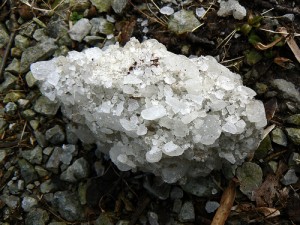
 Well, Winter is around the corner and it’s time to get ready. But you might want to leave the rock salt behind.
Well, Winter is around the corner and it’s time to get ready. But you might want to leave the rock salt behind.
About Rock Salt
Rock salt, also called Halite, is a form of sodium chloride. Halite is most commonly used to help manage ice. People spread it on roads, walkways, and driveways. The rock salt has a lower freezing point causing the ice to melt. Even a small amount will be effective.
Damage Caused by Rock Salt
Rock salt has some really damaging effects.
- Concrete – Concrete is a porous material. It is very resistant to compression but does not have much tensile (stretched or pulled) strength. As rock salt melts the ice, water flows into the concrete. If it refreezes, the forming ice can pull the concrete apart.
- Environment – Rock salt has a negative impact on the environment too. The salt can become toxic to plants preventing photosynthesis. Salt left in soil absorbs water causing root dehydration (chemical drought) and stressing the plant.
- Animals – I’m lumping people into this category too. Animals that ingest rock salt can become sick leading to nausea and vomiting. Rock salt can cause eye and skin irritation.
Rock Salt Alternatives
So what options are around to avoid rock salt?
- Sand is one of the most common alternatives. It won’t melt anything, but it does provide some traction. Sand is especially useful in the bitter cold (below -15° C) when salt is ineffective. But it does have some negative characteristics too. Sand sticks around and you’ll have to clean-up in the spring time. Plus, sand can absorb all kinds of pollutants becoming a vehicle to spread them.
- Urea is another alternative. Urea is somewhat effective at melting snow and provides limited traction. But it can also burn your lawn and vegetation. Urea is a great fertilizer. Not surprisingly, it can cause extreme algae growth.
- Calcium Magnesium Acetate is salt-free and biodegradable. It’s safe for concrete and vegetation. CMA is better at preventing ice (ineffective under -4° C) than removing it. And the price is significantly higher than rock salt.
- Calcium Chloride does less damage than rock salt but is corrosive to metals and damaging to pet paws. It’s a little more expensive than rock salt but does a great job melting ice.
What do you think? What do you use to melt ice?
Image courtesy of Benimoto







Note should be made of the dangers, and required precautions to be taken, when handling calcium chloride. Calcium chloride is a moderately caustic substance when in contact with skin, and the danger level is exacerbated if the skin is moist. At minimum, if the subject has in the least, sensitive skin rubber/vynyl gloves should be worn, or even if the skin is not in the least sensitive, then following contact with calcium chloride, the skin [hands/wrists/etc], should be flushed with volumous amounts of water. Also, it should be noted, that since the chemical is used during the winter, people would be more likely to have open cuts, due to seasonally extra dry skin. Should calcium chloride get into an open abraision of any kind, the sore will not heal until all the chemical is cleaned/irrigated/flushed [naturally or artificially], out of the abrasion.
This property is well documented in numerous places on the web, though most defray from discussion of open sores, but trust me, I have done it—[and once is all it takes], In addition, the same cautions are noted for Potassium Chloride, and some de-icing agents contain this chemical, also.
A primary information source is Dow Chemical’s Calcium Chloride Maual, available at:
http://glchloride.com/brochure/Brochure%20-%20Calcium%20chloride%20handbook.pdf
I am a R&D Lab Engineeer [primarily computers/Data Acquisition/programming-3 languages], but I also possess minors in Organic Chemistry, as well as Inorganic Chemistry. Should you have any questions, do not hesitate to ask.
Sincerely
Sam C. Lyckholm
R&D Lab Engineer [Ret.]
Crestline CA 92325
alot of street rocksalt got in my yard and I have a dog that eats everything, how can I help it dissolve faster?